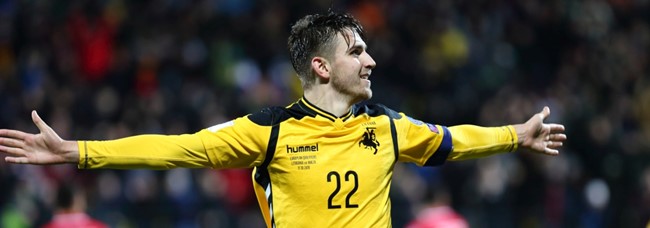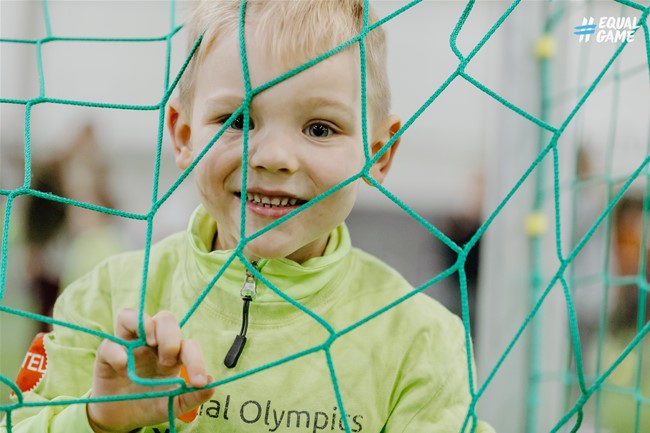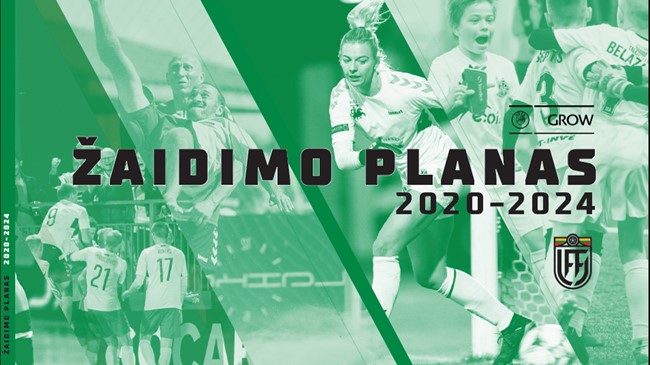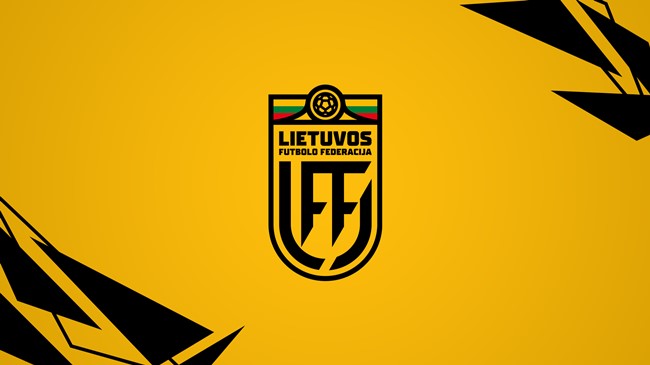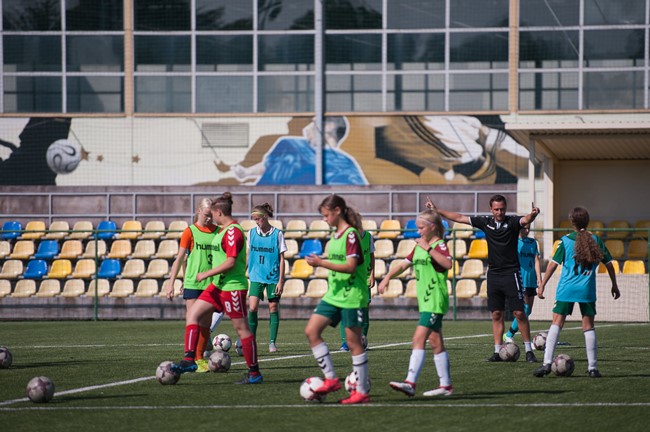“I didn’t think I’d make it in football”, – says Lithuania’s captain and Player of the Year Fedor Černych’s. He told UEFA.com about unorthodox career path that took a Muscovite from Vilnius to Belarus and Poland.
Vaidotas Januška
UEFA.com
It took some time for Fedor Černych to realise he could make a career out of football. After all, he only played in the third division of his home country – that was eight years ago – and has never played for clubs with big reputation. Now he‘s Lithuania‘s captain and leader at the age of 25, scoring goals for fun for club and country, and one of the reasons Jagiellonia are the leaders of Polish Ekstraklasa at mid-way point.
Yet, Fedya, as he‘s affectionately known, is humble as he‘s as anyone and that can traced to his life story. It‘s one of a citizen of Eastern Europe – having been born in Moscow, brought up in Vilnius, started out his professional career in Belarus and now impressing in Poland. In an interview to UEFA.com he told about his some of his curious moments as well as present hopes with Jagiellonia and Lithuania.
– When you were awarded the Player of the Year prize you said it was the most difficult day of your life and very nervous moment. Now, after some time, has the sense of self-pride finally came through?
– Obviously it‘s a big pleasure that I was elected. It‘s great honour, since every footballer in Lithuania would like that. But I am really calm about it and actually started to forget about it. The second half of the season is starting soon, we are beginning our preparations at the club. It‘s time to work hard and try to achieve new, even better results.
– How did you cope with all the extra attention and events that comes with awards like this?
– I try not to think about it. I am just doing my job. Training, playing football, speaking with the media, meeting fans, going to see children – it‘s all part of the profession and it‘s not a problem.
– How was your winter holiday?
– I spent a week in Asia by the sea with three of my friends – also team-mates Lithuania – along with our girlfriends. The rest I was at home in Vilnius. Managed to meet all the friends and family. My mother came back from Netherlands, brother returned from Spain. We all got together for the festivities. Since my family is Orthodox Catholic, we celebrate our Christmas on the 7th, but also I go to celebrate with my friends on the Christian Christmas two weeks earlier.
– You were born in Moscow, but did not live there for long. Any memories still remain?
– I remember my house and the metro station next to it. Some of the most prominent places. But if someone took me to Moscow and asked around I wouldn‘t be a great guide.
As for football-related memories, my uncle took me to Lokomotiv Moskva matches. I had their shirt and since then it‘s my favourite club. And my favourite players were Ronaldo, the Brazilian, and Dmitry Sychev, who was playing in Lokomotiv at the time.
– Tell us how you came to Lithuania?
– My grandfather was a Soviet serviceman, who was travelling through the former Soviet Union. He got designated to Vilnius, but got badly sick there. Eventually he settled there, received a flat here and had six kids. Later my mother – and her brothers – left to Moscow, met my father there. They got married, then divorced and my mother took me back to Vilnius. Where I have been since.
– How did you start playing football?
– I first played on the streets and joined a grassroots team, with a group of kids who were four years younger – since there were nothing similar in the area for my age. Couple of years later I was spotted by coach Nikolai Pupkin and he „bought“ me from the other coach to the Vilnius football school, for two leather balls. Now we laugh about it that it was my first „transfer“. I‘m thankful to him and the school for tutoring me.
– Most of the players, who are similar of your age and are now playing for Lithuania, either played professionally at home or left as teenagers to play in Western Europe. You took a very different path…
– I wasn‘t really wanted by any clubs at first, maybe I was not good enough. I started in the third division – semi-amateur for Granitas. Well, I had offers to join the reserve teams of Žalgiris or Vėtra, however at the same time we went to a tournament in Belarus and Dnepr Mogilev offered me a much better contract with a chance to play in the first team. That‘s how it began there.
We lived in a training base about 15 or 20 kilometres from the city in the forest. It was an old youth camp, a little bit renovated, with two pitches. It was good for football but not easy to live, especially in the winter. The nearest bus station was 3 kilometres walk through the forest. And it was cold in the rooms because the heating wasn‘t working well. You could buy electrical heaters but then the fuses got blown out.
Anyway, I‘ve managed through it all somehow. I remember I wasn‘t really worrying about the conditions or the money I earned too much. I just trained hard and tried to become a better player. It also made me appreciate things more. – now I rarely complain if something is not great because I know how difficult it can be. I am really thankful to Dnepr for that because figuratively speaking I was schooled in a university of life there.
I came as a young lad and left as a national team player. I‘m grateful to the teams in Belarus, and everyone else there. All the people were really good to me and some players were like older brothers, because I was often the youngest.
I‘ve also met my girlfriend Valeria in Belarus. At one period when I was injured, I was watching the match and my team-mate Anton Matveenko brought her – his sister. Then we went to a cafe, got acquainted more and that‘s how our friendship started.
– You started really well though in the first team, scoring twice.
– At first I was in the reserves, because I came at the end of the year. But after some time the coach said: „you will play in the top division“. The night before I couldn‘t sleep. When I was coming on I was shaking like being electrocuted… I wasn‘t feeling myself and maybe that was the reason I scored two goals!
After that I started playing in the first team more. I came to believe I could make a career in football, acknowledged that everything is in my hands – if I do well I could go further. The likes of „Dinamo“ Minsk and „BATE“ were interested in me and it was a motivation to try even harder.
When „Dnepr“ was relegated I was loaned to „Naftan“. It was the first year I played all matches in the starting line-up and I also won my first, and only trophy so far – the Belarus Cup. In the final I scored our second goal but it was not enough as the game finished 2:2, but we won on penalties. It was only the second trophy in club‘s history and the celebrations, well, let‘s just say, were very very long (laughs).
– You were mostly a midfielder in Belarus, but started scoring goals after joining Górnik Łęczna in Poland and being converted to a forward position. How did that happen?
– When I came to the team I was a winger, but there was no real striker in the team. The coach asked if I played upfront, I said no, but he said „I‘ll teach you.“ The first game was rather terrible, but the coach believed in me and soon after I scored two goals. From there it went better for me in attack. Now I play in both positions – in the wings or upfront. I‘m not really sure now what‘s my best position. Perhaps in the national team I am more used to the wing position, because we play in a different way. In any case, I can play wherever the coach needs me.
– You only scored three times in first half a season with Jagiellonia Białystok and the team finished 11th. Fast forward six months and you are top of the league. What has changed?
– When I came it was sort of a transition year. The season before the team lost some key players and replaced them with new ones. The coach [Michał Probierz] has had to build the team again and even though we performed well most of the times, we were lacking some luck, some mutual understanding in the team. This season we have more or less the same guys. We started the season good and grew in confidence.
Do we aim for the title? The objectives before the season were the top-half of the table, but now our ambitions grow, so why not? I don‘t feel any pressure. We are just going to continue playing our football and see where it gets us.
– Near the top of the scoring charts in Poland is Estonian midfielder Konstantin Vassiljev has 10 goals, and you, after scoring 9. Does it help you are both from the Baltics?
– I guess so, after all, we get on very well. We have a band of Russian-speakers – the two Balts and two Ukrainian players in the team. We often meet, go out for dinner together. On the pitch, I am usually upfront and Kostya is behind me. First year we couldn‘t complement each other well, now it‘s much better – you can see the results. Nevertheless, you cannot say it‘s just us two. All the team worked hard for the goals.
– So far you‘ve played football quite close to Lithuania, in the neighbouring countries. Is it something you took in to consideration when choosing clubs?
– No, it just happened like that really. Actually, I was never really planning to play football professionally. Later, I never thought about going to Belarus. After that, I was thinking it would be difficult to find a club in Ekstraklasa. I am just taking it easy and going step by step. Who knows, maybe I‘ll have to get back to Lithuania?
– How do you feel about the transfer window opening up in January, since it‘s very likely some transfer speculation will go on that might involve you?
– I am really calm about it. Jagiellonia can achieve some great results this year and I think the club wants to keep all the players.
– Still, there is a a dream club or league for you?
– For the club I would say it‘s Lokomotiv. As for leagues – playing in Germany, France or even Netherlands would be fantastic. England or Spain? Well, it would be very difficult to get there, I am more realistic. Of course, if an offer came from there it would be hard to turn down.
– You were born in Russia. How did you end up playing for Lithuania?
– One of my coaches, Gennady Davidson, was also an assistant manager in the youth national teams. He said I could be called-up if I get a Lithuanian passport. I asked my mother for this, we talked about it a lot, she was reluctant at first, but finally I convinced her. The process took a couple of years and after that I was not needed anymore. I had to wait for the Under-19‘s for a first call-up.
– Your brother Ruslan Černych has also made it to the Lithuania ice-hockey team. Why did you choose different sports? How is his career going?
– In childhood I took him to football matches. He didn‘t want to run so I took him in goal, but he didn‘t fancy that. Eventually, although only about 11-12 years old, he tried ice-hockey and liked it very much. He was in the Vilnius hockey school for until 18, when he got an offer him to go to the USA to study and play. In first year I helped to pay the tutorship fee, the second year was gratuitous. After that he went to the Spanish ice-hockey league and turned professional.
– You often mention your mother. How much of an influence is she to your career?
– She always supported me. We are not from a rich family. There were four of us living: my mother, younger brother and my grandmother. My mother worked really hard to get me good football boots and everything else what I needed to play football. She helped change my citizenship. What I‘ve achieved is thanks to her, and I‘m very grateful. I love her a lot.
– In 2013 you made your competitive debut for Lithuania – in your hometown Vilnius you scored and assisting in a win against Latvia. A perfect debut?
– Definitely, everything was like a dream. And I rarely score headers. but headed in from a corner in that match!
– Just three years later you were handed the captain‘s armband for Lithuania. How did it happen and was it a big surprise?
– Before the friendly match versus Romania in the hotel the coach [Edgaras Jankauskas] came up to me and said I will have to lead the team out. I was really surprised because such a thought never crossed my mind. I thought maybe that wasn‘t serious or just for one time, because we have several much more experienced players. Later I was also captain against Russia, then in the qualifiers and I stayed on.
– As the new captain you have lead the line spectacularly, scoring five goals…
– Maybe it‘s my lucky charm? On a serious note, all the guys helped me achieve these goals, I just needed to finish the job.
– In the FIFA World Cup qualifying Lithuania surprised a few people – drawing with Slovenia and Scotland, although you were twice ahead in two of those matches, and earning five points. How do you feel about the results?
– The feelings are mixed. On one side we could have had nine points, but that ‘s how football goes. We couldn‘t manage to keep up until the end and conceded disappointing late goals. On the other hand, few expected us to take the game to them, and that they would need to come from behind. We should take the positives out of those games as points won, not lost.
– The fans in Lithuania have been much more positive about the team. How much did the new coach, Edgaras Jankauskas, influence the rejuvenation of this squad?
– First of all, I would like to say it‘s sad for me about how the previous coach, Igoris Pankratjevas, has been portrayed in a negative light. I think we have to give much credit to his work in the previous cycle, because he brought up young players like me in to the national team. It helped us a lot because we got some experience at the international level and now we became a better team.
As for Edgaras Jankauskas, he brought many new things with regards to the training sessions and analysis. He is a great motivator and everyone is comfortable working with him. He played under such great coaches like José Mourinho and he is transmitting that experience to us. Obviously, he is a great authority because he‘s one of the greatest Lithuanian footballers ever, if not the greatest. Everyone knows what he‘s achieved and is appreciating his messages.
– Your next FIFA World Cup qualifier is versus England at Wembley in March. You played the same fixture almost exactly two years ago and lost 4:0. Do you think you are better prepared this time around?
– It‘s hard to predict what will happen. We know England are top team and favourites, but we have nothing to lose. No one is going to put us to the sword if we lose. We will try to show what we are capable of, the coaching staff will advise and prepare us. If we play as a team and control our nerves, I think we can get a result.
– What are your objectives for 2017?
– To be honest, I‘m not planning too much or setting large objectives. In some way it puts pressure on you, you start to think about how it goes and when it doesn‘t go well. I‘m going just to do whatever is possible and try to become better.

